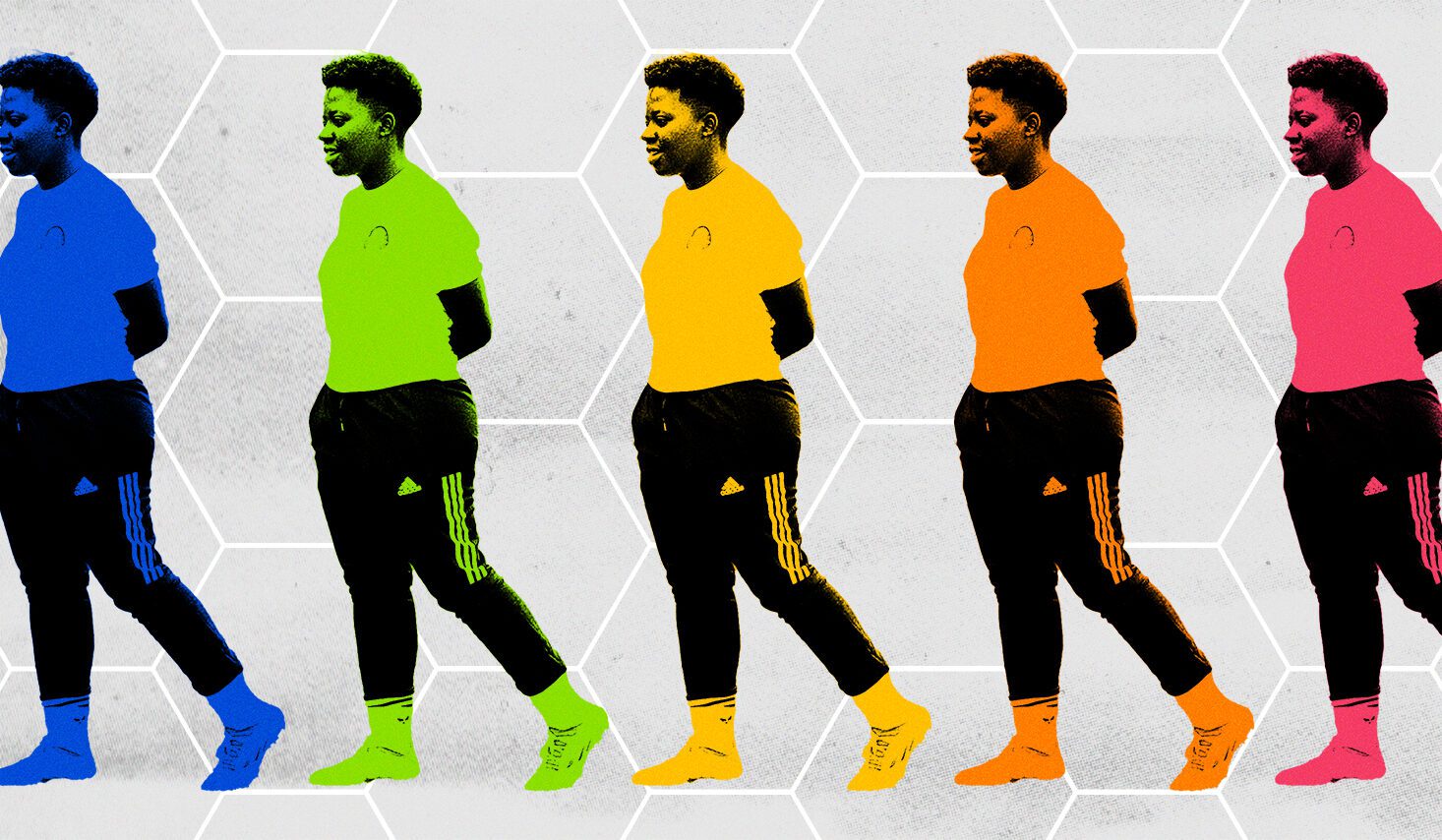
Football is Betty Mayeya’s everlasting love. As an avid Manchester United supporter and keen player herself, the sport’s presence in her life has been constant. Playing at a grassroots level at an early age taught Mayeya the importance of accessibility within football. “Growing up in a single parent household, my dad struggled to take me long distances to attend training sessions for bigger clubs, so I accepted that football was something that I was able to enjoy if it was within walking distance,” she tells GAY TIMES. Growing up a Black, queer woman within the footballing world, the goalposts of accessibility have shifted for Mayeya and now, working with Stonewall Football Club, Betty is on a mission to make football a safe space for all.
Having campaigned to improve the experiences of of queer people within a notoriously homophobic sport for over 30 years, Stonewall F.C. have established their place in the history books as pioneers of LGBTQ+ sporting rights. The volume of silverware accrued over the course of the club’s lifetime proves that Stonewall F.C. makes as big of an impact on the pitch as they do in wider footballing culture. Yet until recently, women were excluded from this activism. As the world finally begins to recognise the skill and inclusive potential of women’s football, Betty was appointed as the first-ever coach of Stonewall F.C. Women and Non-Binary people’s team in 2021. For Betty, the decision to join the club was a no-brainer, “Inclusivity is woven into the fabric of Stonewall and I wanted to be a part of it.”
Stonewall F.C. is open to new players regardless of their playing experience, Betty explains, a deliberate choice made with the understanding that many queer people may have previously faced barriers to participating in the sport. Players can compete at advanced and intermediate levels for the chance to rank in local divisions or they can simply work on skill building and socialise with others in the beginners leagues. Often, conversations about LGBTQ+ inclusivity in sport focus on homophobia, but Betty is determined to encompass all queer identities. “We reiterate that people can play regardless of their gender, in many other teams the set up is very binary and sometimes athletes are asked to prove which team they should play for, whereas if you come to me as coach and ask to play, that’s it, I’m not here to question anyone’s anatomy or gender identity.”
Such policies signpost Stonewall F.C. as a refreshing safe space in a sporting industry that is often not as accommodatingly progressive and for Betty, this inclusivity is what continues to attract new players, “Our policies are more inclusive than those proposed by mainstream organisations like the FA and that is part of our pull.” Betty says that the continued expansion of the club is evidence that their approach is working, “We began with no players and now we have around 60 regular players. Seeing the progress and watching people make new connections just reminds me why I do this.” The pride Betty takes in her work shines through her words as she describes what it means to be Black, queer and visible within football. “I have always been coached by white, cisgender men and thinking about my teenage self I’d have been in awe of a coach like me,” she smiles.
Betty notes the importance of racial diversity within football. Despite strides being made to improve LGBTQ+ participation within the sport, there are still challenges faced by those with intersecting identities. She notes that it can be frustrating when she recognises how the wider footballing world is lagging in comparison with her club’s vision. Yet all she can do is persevere and as Stonewall F.C. grows, she has been able to continue her accessibility mission; foregrounding discussions on what it means to be queer and Black in the footballing industry. “We did an event in partnership with EA Sport and Adidas centred on what it can be like to be Black spaces that are usually predominantly filled with white men who enjoy football in a very different way to how people like myself may enjoy it.” As someone who has relied on football as an escape from life’s troubles, Betty is determined to improve the sport’s landscape for others like herself, “When you’re surrounded by people who don’t understand the lived experience of Blackness, even within the LGBTQ+ community, it feels like something is missing, it doesn’t quite feel like home but football is my home.”
Fostering these important conversations has allowed Betty to share her own truths, “I’ve looked around a stadium and I’ve been the only non-white person, and I think it is important to vocalise these experiences and talk about why some people feel excluded if we are to truly build an inclusive team and culture.” Talking about her identity has won the hearts of others in similar situations. Betty explains, “A key moment for me was when a Black woman from South London reached out to our team, she said seeing me as a queer Black darkskin woman coach really allowed her to find her home at Stonewall, and that makes it so worthwhile.”
Recently, Betty made the decision to step down from the role of women’s and NB team coach, deciding to take a more active role in determining the structural direction of the club going forward. Explaining her decision she says, “I’m now on the committee spearheading the team in a different way and seeing what we can do to expand and grow. I want to be in the room where it happens and effect change on a systematic scale.” Alongside this, Betty hopes to create her own initiatives to foster positive experiences for Black women in football and, playing her cards close to her chest, she admits that the future is exciting, “This project was sparked by the reactions to the lack of Black players at the top flight in Women’s football. To some, the absence of diversity put a dampner on celebrations and I think there is definitely an opportunity to elevate voices. I just want to continue opening up football to everyone.”



